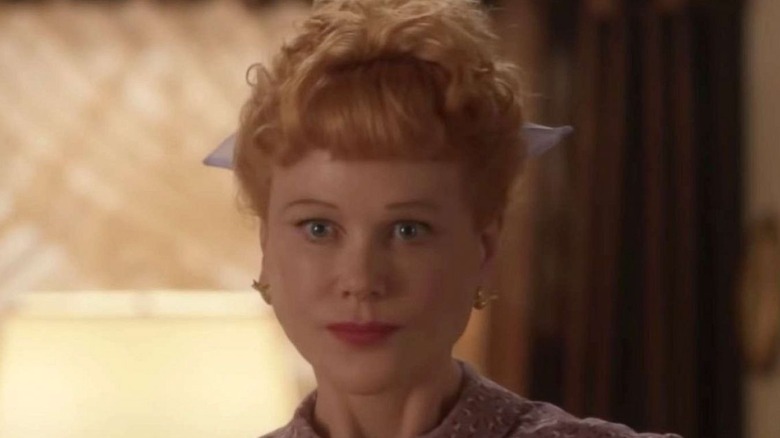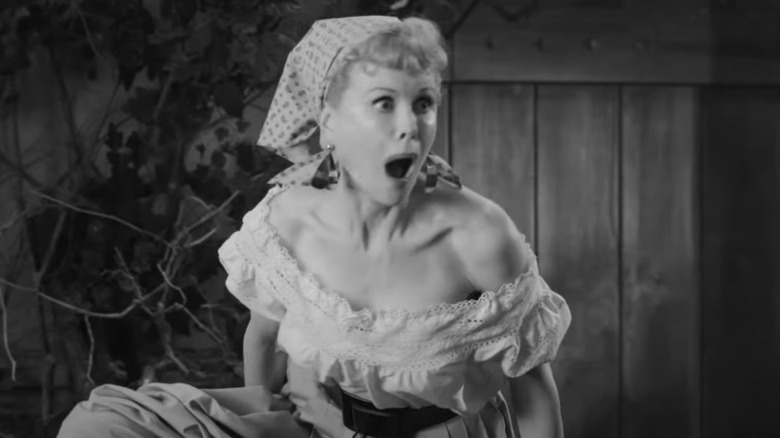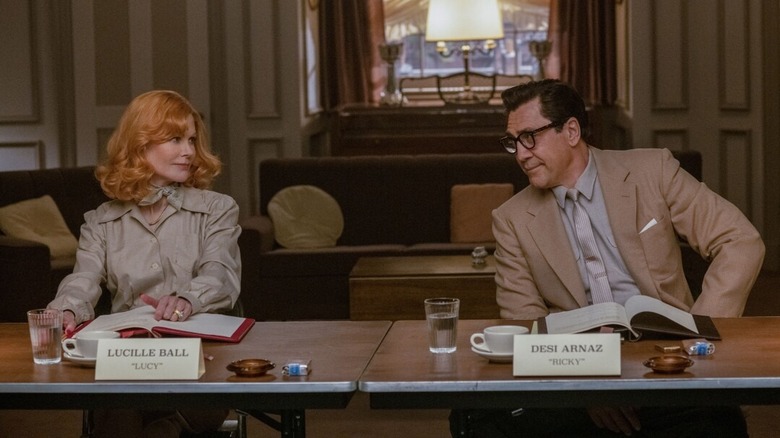Being The Ricardos Review: Sorkin Loves Lucy
Aaron Sorkin likes stories about troubled geniuses, whether that genius is in politics ("The West Wing"), technology ("The Social Network"), protest ("The Trial of the Chicago 7"), or just plain hustling ("Molly's Game"). He has an eye for getting to the core of people blessed with such gifts and simultaneously afflicted with the price they must pay for them, and it's taken him to the heights of Hollywood screenwriting and allowed him to move forward into directing along the way. He also loves behind-the-scenes stories, as evidenced by everything from "Sports Night" to "The Newsroom," because digging into what goes on when the cameras aren't rolling and in the audience doesn't have their eye on the stage is a great way to mine the depths of trouble genius.
With those factors in mind, "Being the Ricardos" feels like a natural fit for Sorkin, another in his ever-expanding line of stories about brilliant people embroiled in turmoil even as the show must go on in one way or another. Like so many of Sorkin's works that preceded it, "Ricardos" combines a well-known American cultural institution, an all-star cast, and a story that merges fact and fiction into a film that feels like an attempt at all-encompassing statement on its subject matter. In theory, it all works great. In practice, it works most of the time, but Sorkin's knack for dramatic flourishes can't overcome the clunkier elements of his structure, and the sense that he's perhaps too swept up in the calculated thinking of his narrative to deal with the kind of raw emotion his subjects were capable of.
Lucy and Desi
Set in the early 1950s as "I Love Lucy" is becoming one of the most successful programs on television, Sorkin's script follows the lives of Lucille Ball (Nicole Kidman) and her husband and collaborator Desi Arnaz (Javier Bardem) during a single, pivotal week of production on the series. As the week begins, a new report about Ball's Communist ties has just resurfaced after a government panel supposedly cleared her, while Ball's looming pregnancy creates issues for the show even as Arnaz is determined to convince network and sponsor executives to let the pregnancy be a storyline on the series. Plus, co-stars Vivian Vance (Nina Arianda) and William Frawley (J.K. Simmons) are fighting as always, the show's writers (Tony Hale, Alia Shawkat, and Jake Lacy) are trying to hold the new episode together, and Lucy herself can't wrap her head around a key bit of comedic business early in the script.
All of these ingredients form the kind of workplace chaos that Sorkin's scripts thrive on, whether it's the Oval Office turmoil of "The West Wing" or the backstage drama of "Steve Jobs." His percussive dialogue really hums when a lot of things are happening at once even while a central figure can't let go of one key element, and that's on full display with "Being the Ricardos," as Sorkin's intense drumming on Lucy's comedic fixations is juxtaposed against the very real challenges she's facing outside of her fictional life. At its core, even when it struggles, this sense of white-hot intensity glowing in the center of all the showbiz chaos and celebrity gossip makes the film consistently watchable.
Without a directorial collaborator to take the edge off his worst instincts, though, Sorkin's script also shows signs of slight overindulgence. Setting aside that he's taking some clear dramatic license with Ball and Arnaz's real-life timeline (which, hey, it's a movie), there's the sense that he couldn't quite decide where the focus of the film should really lie, so there's an almost scattershot offering of side stories to consider. Whether it's a series of flashbacks depicting the earlier romantic adventures of Ball and Arnaz or a smattering of talking head segments that flash forward to interviews with more present-day versions of key figures in the show (namely the writers), there's a sense of, if not derailment, then at least wobbly structure at work in the piece. It doesn't knock it completely off course, but it doesn't exactly add to the points Sorkin's trying to make, either. "I Love Lucy" is one of the single most famous TV shows ever produced. Why do we need segments attempting to retroactively explain elements of it, particularly when the film has already shown us its re-enactments?
Structural stumbles
The best thing about "Being the Ricardos" is Sorkin's ability to place acting powerhouses front and center and simply let them work, without a great deal of directorial interference in the up-close work of character building. And indeed, Kidman, Bardem, Arianda, and Simmons are clearly playing characters, versions of the "I Love Lucy" quartet that combine popular imagination with emotional vulnerability, raw talent, and Sorkin's knack for drama. Many of the film's key scenes play out like stage plays, as characters move through a single space in a series of lengthy, unbroken conversations that allow us into their hearts and minds. In that regard Sorkin reveals himself to once again be a competent director, and the cast (which includes some scene-stealing work from Hale and Shawkat in particular) to be an assemblage of true stars.
The real struggle of "Being the Ricardos," then, apart from the structural issues and its tendency to blend fact and fiction in sometimes jarring ways, is in finding the real emotional point at the core of the film. It's about Ball and Arnaz's tumultuous marriage, yes, but it's also about Arnaz's knack for dealmaking and Ball's tireless commitment to craft. It's about the warring personalities making the show, yes, but it's also about the brief Lucille Ball Communism scandal, how it was resolved, and what that says about the way we deal with scandals and "cancel culture" now. It's about all of these things and about half a dozen other key elements, and in the end it never quite settles on any of them to really drive the piece home. Yes, there's a resolution, and it points in a certain key direction, but the emotional arcs of the film are fragmented, crisscrossed with several other long-running threads that pull in sometimes opposing directions. It's a tangle that makes "Being the Ricardos" a slightly hollow, if generally entertaining, film experience.
"Being the Ricardos" is in theaters December 10, and on Amazon Prime Video December 21.


